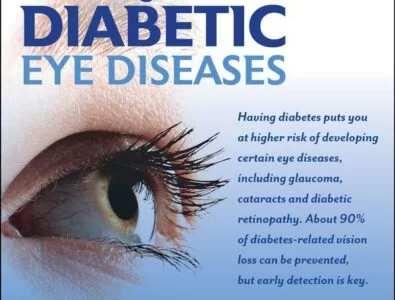Diabetes and Eye Sight: Understanding the Connection

Diabetes is a chronic condition that affects millions of people worldwide. It occurs when the body is unable to properly regulate blood sugar levels, leading to a range of health problems.
One of the most serious complications of diabetes is damage to the eyes, which can lead to vision loss or even blindness.
This article will explore the connection between diabetes and eyesight and discuss ways to protect your eyes and maintain good vision.
Understanding Diabetes and EyeSight.
Diabetes is a leading cause of blindness in adults, and people with diabetes are at a much higher risk of developing eye problems than those without the condition. This is because high blood sugar levels, a hallmark of diabetes, can damage blood vessels in the eyes. This can lead to a range of eye problems, including:
- Diabetic retinopathy is the most common cause of blindness among people with diabetes. It occurs when blood vessels in the retina, the light-sensitive layer at the back of the eye, become damaged. This can lead to bleeding and swelling in the eye, and can cause vision loss or blindness.
- Diabetic macular edema occurs when the macula, the part of the retina responsible for central vision, becomes swollen. This can lead to blurred vision and difficulty reading or doing other activities that require fine vision.
- Cataracts: People with diabetes are more likely to develop cataracts, a clouding of the lens of the eye that can cause vision loss.
- Glaucoma is a group of eye diseases that can damage the optic nerve and cause vision loss. People with diabetes are at a higher risk of developing glaucoma.
Preventing Eye Complications
The best way to protect your eyes from diabetes-related complications is to control your blood sugar levels. This means following a healthy eating plan, getting regular exercise, and taking any medications prescribed by your doctor.
It’s also important to have regular eye exams, even if you don’t have any symptoms of eye problems. Early detection and treatment of eye complications can help prevent vision loss.
Treatment of Eye Complications
If you do develop eye complications related to diabetes, there are several treatments that can help slow or prevent vision loss. These may include:
- Laser therapy: This treatment uses a special laser to seal off the damaged blood vessels in the eye, preventing bleeding and swelling.
- Injections: Medications can be injected into the eye to help reduce swelling and improve vision.
- Surgery: In some cases, surgery may be needed to remove a cloudy lens or repair a damaged retina.
Living with Diabetes and EyeSight
Living with diabetes can be challenging, especially when it comes to protecting your vision. However, with the right support and a commitment to managing your blood sugar levels and having regular eye exams, it is possible to reduce your risk of eye complications and maintain good vision.
Remember to follow your doctor’s advice, eat a healthy diet, and exercise regularly to control your blood sugar levels.
In conclusion
Diabetes and eyesight are closely related. High blood sugar can cause damage to the eyes, leading to vision loss or even blindness. Diabetic retinopathy, diabetic macular edema, cataracts, and glaucoma are the most common eye complications caused by diabetes.
The best way to protect your eyes from diabetes-related complications is to keep your blood sugar levels under control, have regular eye exams and follow your doctor’s advice, eat a healthy diet and get regular exercise. With the right support and a commitment to managing your diabetes, it is possible